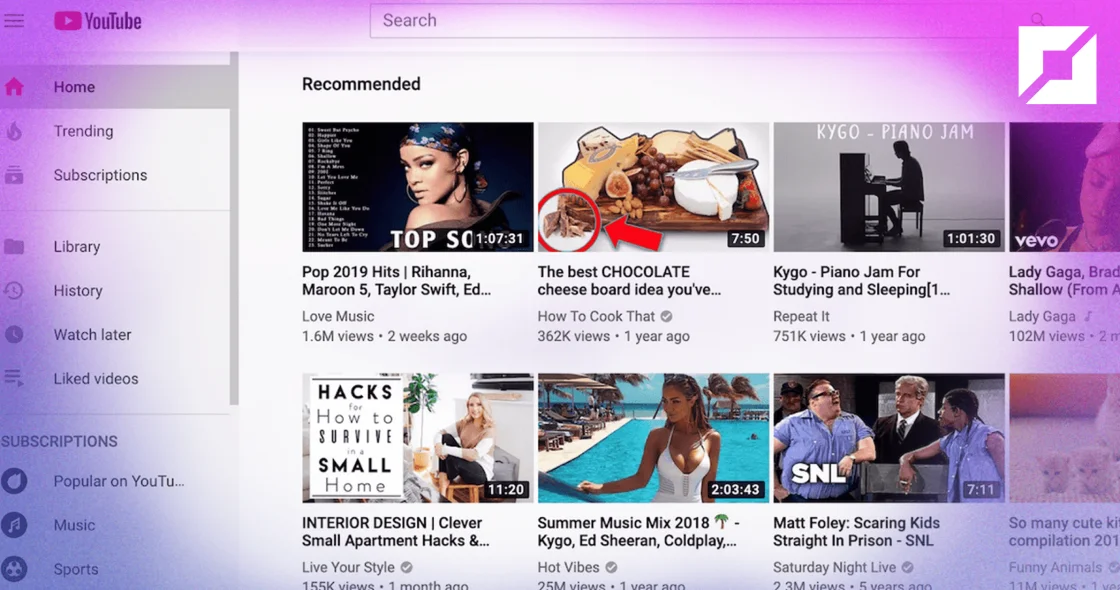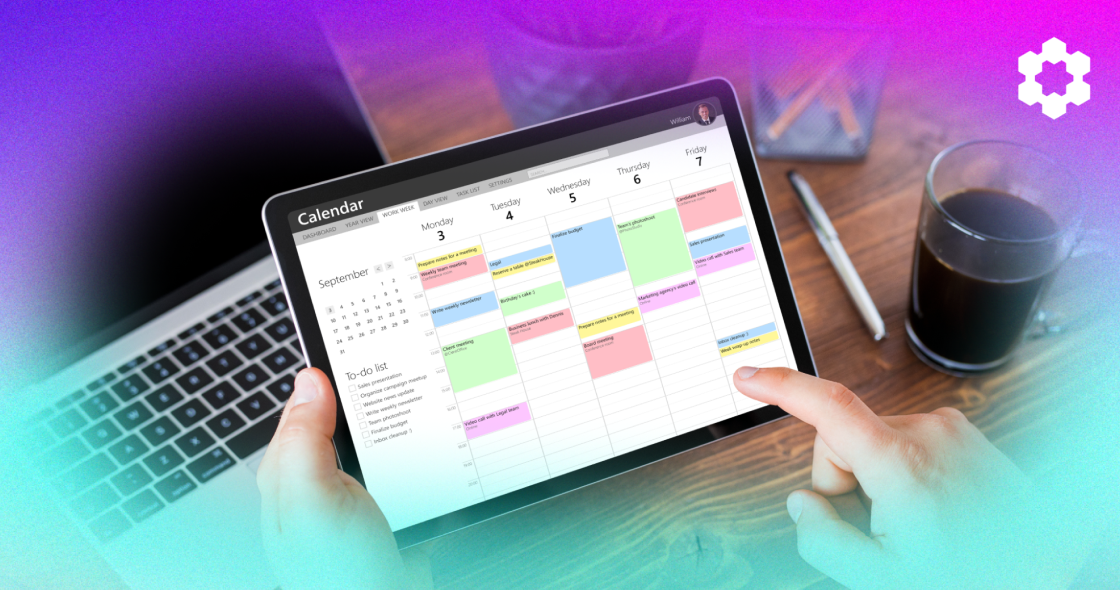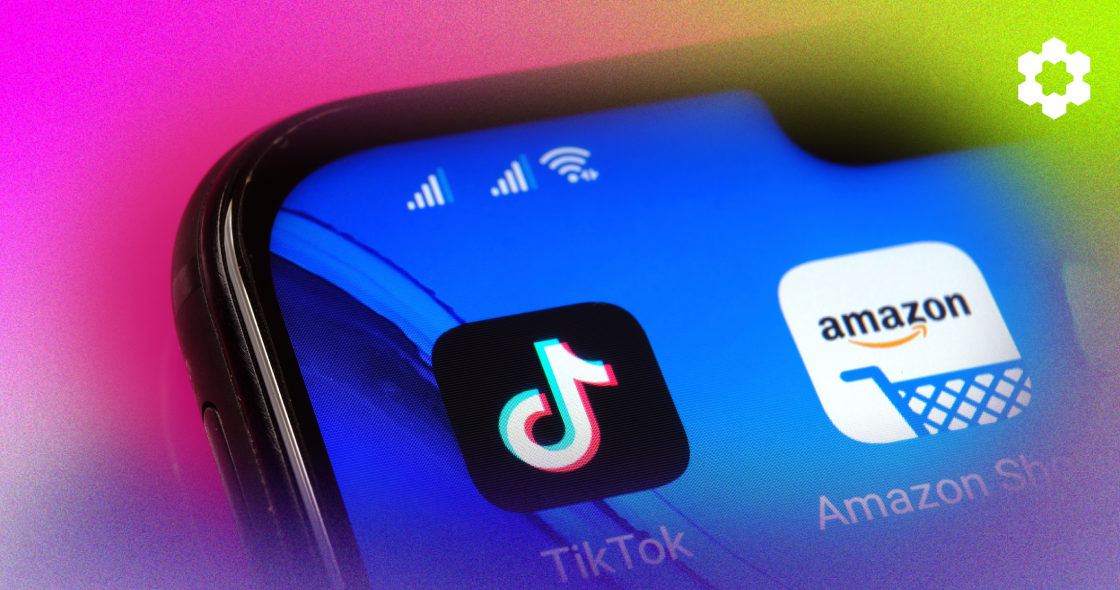We all know content is king, and in the past few years, it’s become clear that video is king 📹.
Around the globe, YouTube is currently the second most popular social platform with 1.9B monthly active users, just behind Facebook.
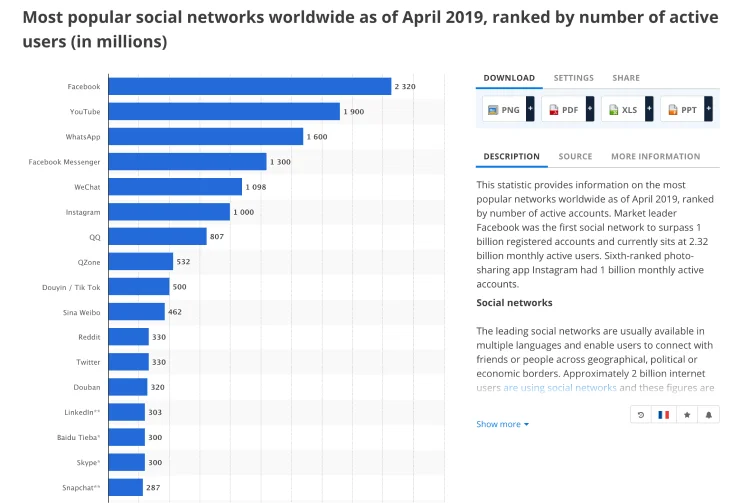
YouTube has also continued to be highly effective for generating brand awareness & leads, and influencing purchase decisions across any major vertical – including both B2C and B2B.
GoPro is one of the largest B2C brands on YouTube, with nearly 7M YouTube subscribers and 2B video views.
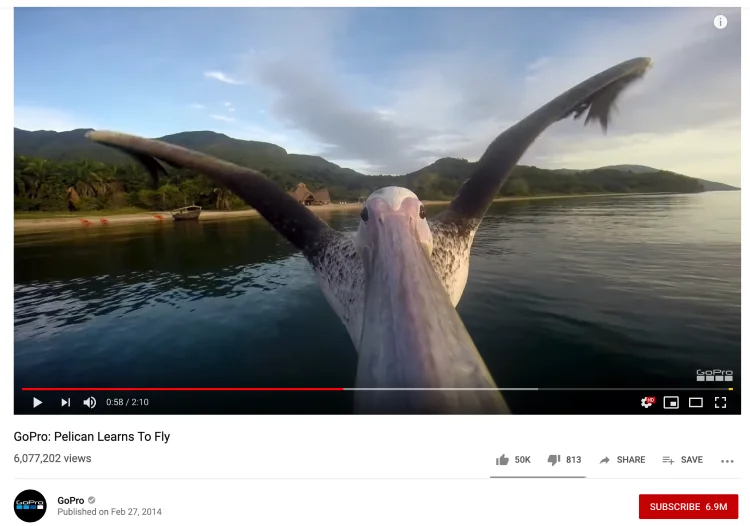
Their secret sauce 🍝? Of course it helps that their product lends itself to super exhilarating and entertaining content, but they use the same tried and true tactics for any marketer: posting regularly, engaging with customers, and creating content tailored to their audiences of outdoor enthusiasts, sports fans, and photography lovers.
In terms of video types, the 4 most popular YouTube video categories watched are: comedy, music, entertainment/pop culture, and “how to” videos. So if you’re wondering whether YouTube can also be an effective way to get the word out about your B2B business via product tutorials, in a nutshell, yes 😉.
Consumers these days tend to visit multiple channels before making a purchase – especially if you’re a B2B company where it can take multiple months before someone signs up. So people who visit your YouTube channel may still need more warming up before they become a customer.
To help you heat up and remarket Youtube viewers, below we’ll share:
- 3 types of YouTube videos and examples for getting more views and engagement
- 4 ways to promote your YouTube videos to increase your traffic and retargeting audiences
- 4 steps for retargeting your YouTube viewers with Facebook Ads
3 types of YouTube videos
📺 1. Product demos: Since everyone has limited attention spans, visually engaging people on your products and their benefits is a great way to educate potential customers on how your business can help them.
Example: Amazon has a dedicated Fulfillment by Amazon (FBA) YouTube channel covering their products, features, and success stories.
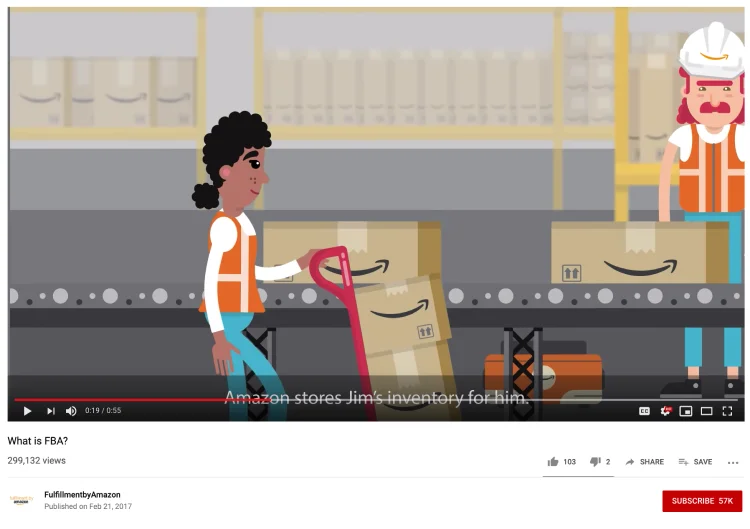
📺 2. How to tutorials & tips: How-to video tutorials, educational videos, and best practices on key topics your audience is interested in can help you rank highly in YouTube search traffic.
Example: Neil Patel regularly shares educational videos covering SEO, social media marketing, and entrepreneurship which generate over 720,000 monthly views, with the top traffic source coming from YouTube Search.
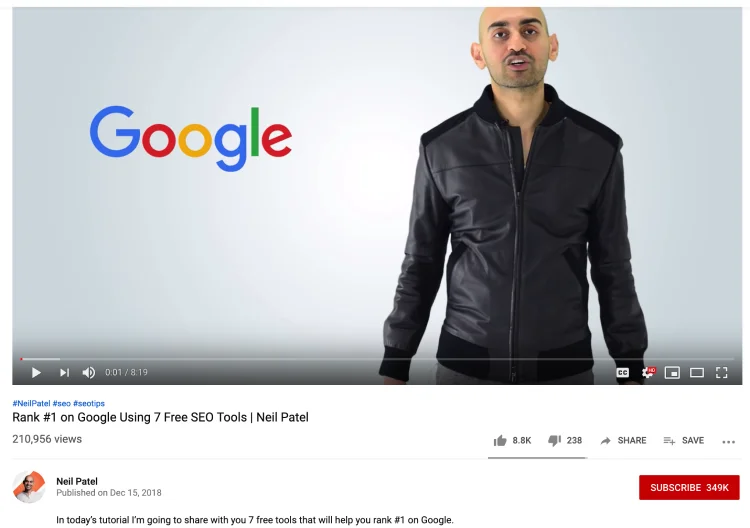
Pro tip: the great part about how-to videos is they don’t necessarily need to be costly in production value. You can even test using free video recording tools like Loom (which we use at PixelMe!).
📺 3. Case studies & interviews: Getting other people to talk about your business is one of the most effective forms of growing word of mouth, building trust, and inspiring potential customers to use your products and services.
Example: Guitar Center has an entire “Guitar Center Artist Interviews” playlist dedicated to telling ongoing inspirational stories about how musicians use their instruments.
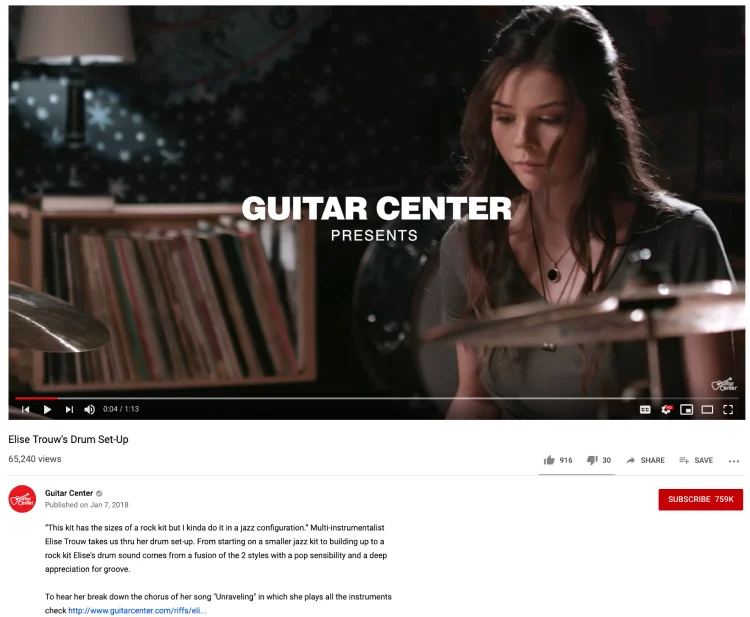
4 ways to promote your YouTube channel
- 1. Website: share your YouTube channel in your homepage footer, cross-promote your videos on your blog, in landing pages, case studies, and more.
- 📱 2. Social media: get more views for your videos by posting them across your social media channels on Facebook, Twitter, LinkedIn, and Pinterest.
- 📣 3. Ads: running online ads to your YouTube videos can help you test different targeting audiences and understand which video topics, content, lengths and more perform best.
- 📩 4. Emails: share links to your YouTube videos in your email newsletters and customer onboarding campaigns to educate new and existing customers.
As another reminder, it’s a good idea to see your YouTube channel like your blog, where you have a steady rotation of fresh and engaging content to keep potential customers coming back.
4 steps to retarget your YouTube visitors with Facebook Ads
Before starting:
- Sign up for a free PixelMe account. Everyone gets a free 7-day trial (no credit card needed!).
- Open up a new browser tab with your Facebook Business Manager.
Note: our guide below covers retargeting people who clicked on your YouTube video links with Facebook Ads, but you can similarly retarget these people across any ads platform 🙌.
Step 1: Connect your Facebook Pixel to your PixelMe account
To find your Facebook Pixel ID, go to your Facebook Events Manager. Copy the Pixel ID of the pixel you’d like to use.

Next, go to your PixelMe dashboard, click on “Settings” at the top, to get to the Pixels tab, where you can paste your Facebook Pixel ID and any others.
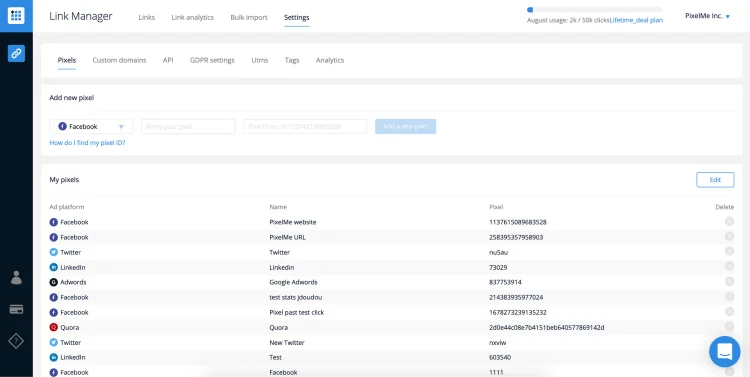
Remember to give it a name that’s easy to remember, and you’ll then be ready to embed a retargeting pixel to every link you share! 🙌
Step 2: Add your YouTube video links to PixelMe
In your PixelMe dashboard, shorten your YouTube channel link and YouTube video links with your Facebook retargeting pixels included. You can include just your Facebook Pixel or all of your advertising pixels in every link!
From the Audience Builder tab:
- Click on “Campaigns” at the top of your dashboard.
- In the top-right, click on the blue “Add a Redirect” button.
- Then, in the Destination URL, paste your YouTube video link.
- Under “Pixels”, select your Facebook Pixel plus any others.
- Add UTM parameters to your link so you can track where your click traffic comes from in your PixelMe dashboard.
- Finally, to keep your links organized and track what you’re using them for, remember to add your links to Campaigns and Sub-campaigns.
Hit “Create your link” and you’ll find your link in the new Campaign and Sub-campaign you just created 🎉
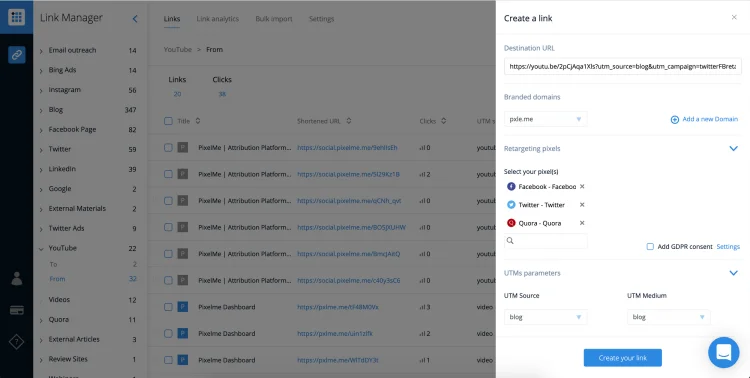
Step 3: Build your YouTube Custom Audience
Now it’s time to start sharing your YouTube links across your site, social media, and ads. Anytime someone clicks on your link, as long as Facebook can identify them, they’ll get added to a super targeted Facebook Custom Audience.
Once you’ve given your URLs a few days to generate traffic, you should start seeing the number of clicks go up in your PixelMe dashboard. You can then setup your Custom Audience.
From your Facebook Business Manager menu, go to the Assets > Audience tab.
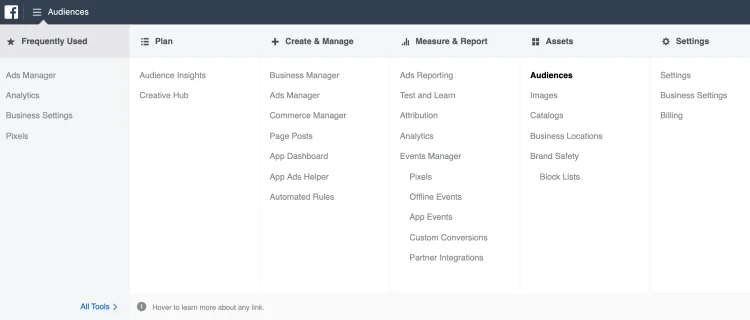
Click on the blue Create Audience > Custom Audience tab, and select “Website traffic” to filter for people who visited a specific webpage.
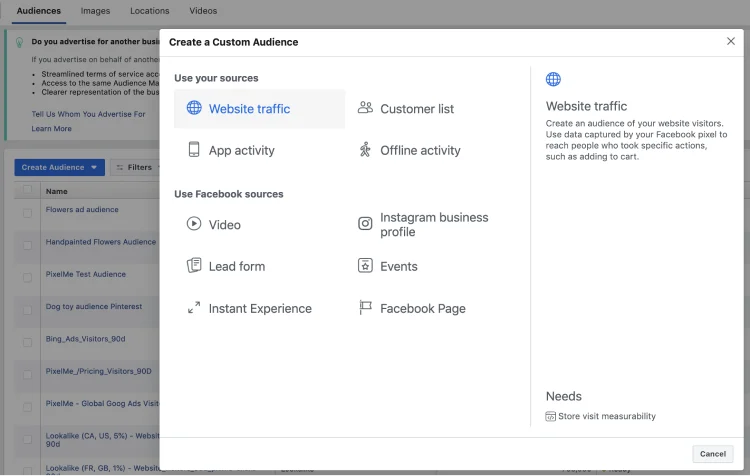
To target users who specifically clicked on your YouTube video links, you can set the URL to “equals” and put in the link(s) you want to use.
Simply copy/paste the shortened links from your PixelMe dashboard, give your Audience a name, and hit “Create Audience”!
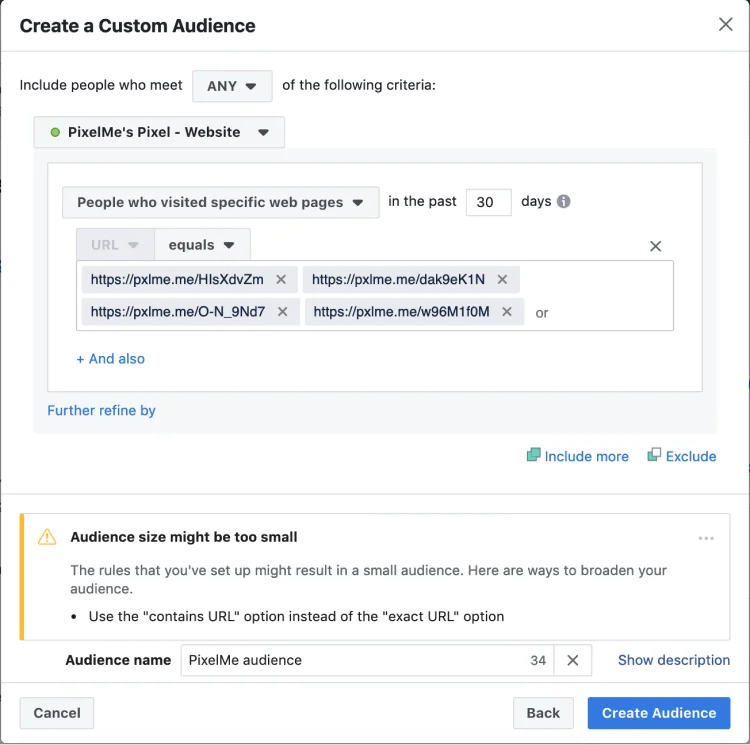
Step 4: Launch Facebook Ads to retarget your YouTube viewers
You’re almost there – now that your Custom Audience is set up, let’s retarget people who watched your YouTube videos 🔥.
- In your Facebook Business Manager menu, select Ads Manager in the top left.
- Click the green “Create” button to create a new Campaign, Ad Set, and Ad.
- From your new Ad Set, in the Custom Audiences box, you should see the list of Custom Audiences you created and the number of people each audience contains 🔢.
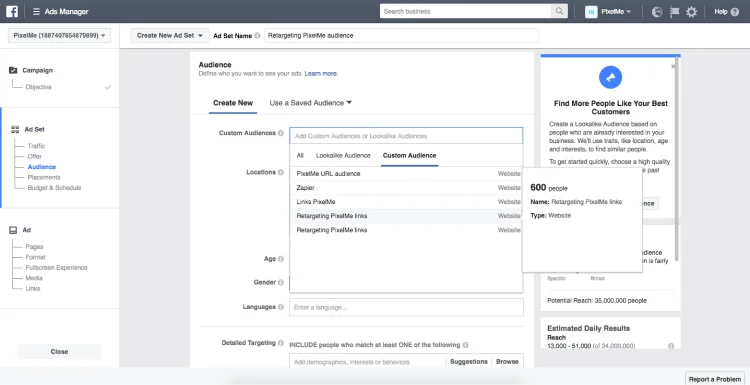
Then, setup the rest of your ad creative, and you’ll be all set!
You’ll be on your way to remarketing to anyone who watched your YouTube videos with Facebook Ads, and can bring them back to your own site to more easily convert them 💣.
Want to re-engage your YouTube viewers? sign up for a free 7-day PixelMe trial
